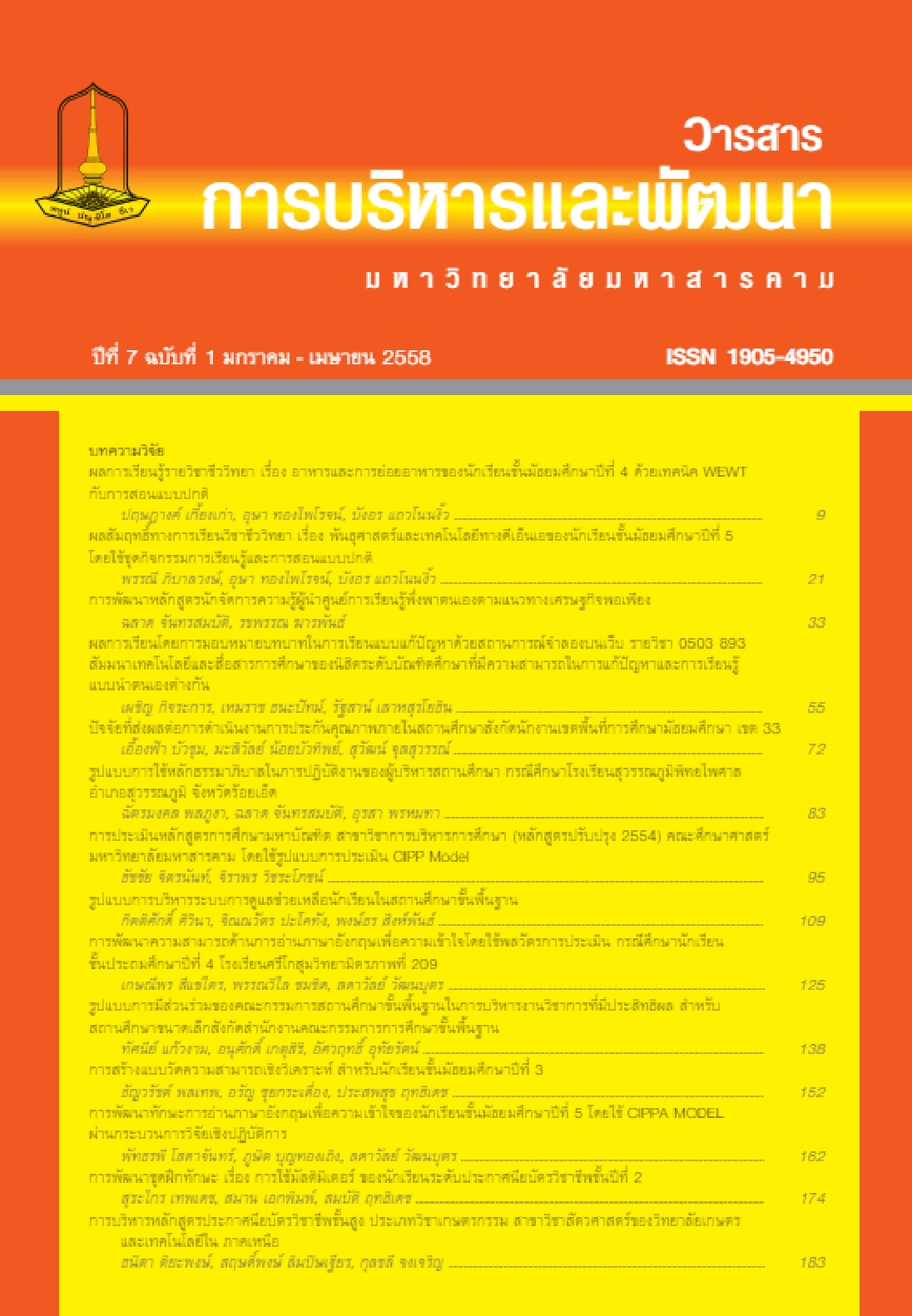Factors Affecting Implementation of Internal Quality Assurance at School under the Secondary Educational Service Area Office 33
Main Article Content
Abstract
The purposes of this research were to 1) Study the levels of factors affecting implementation of internal quality assurance at secondary educational service area office 33. 2) Study the levels of implementation of internal quality assurance at schools under the secondary educational service area office 33. 3) Study the relationships between factors affecting implementation of internal quality assurance in Leadership, Structure, Technology, Communication, Attraction and implementation of internal quality assurance at schools under the secondary educational service area office 33 and 4) Study the construction of prediction equations. The samples consisted of 458 administrators and teachers under the secondary educational service area office 33. They were acquired by Stratified random sampling method. The research instrument was the 86 item five - level rating scale questionnaire, with discrimination ranging from 0.20 to 0.93 and reliability of 0.97. The statistics used included percentage, mean, standard deviation, Pearson product moment correlation and stepwise multiple regression analysis.
The findings revealed that:
1. The levels of factors affecting implementation of internal quality assurance at school under the secondary educational service area office 33 as a whole and individual aspects were at the high level. 2. The levels of implementation of internal quality assurance at school under the secondary educational service area office 33 as a whole and individual aspects were at the high level. 3. The factors affecting implementation of internal quality assurance in Leadership, Structure, Technology, Communication, Attraction had positive relations to the implementation of internal quality assurance, at .01 level of satisfied significance. The correlation coefficients were .640, .628, .597, .666 and .706. 4. The variables used in predicting the factors affecting implementation of internal quality assurance at school under the secondary educational service area office 33 were the correlation coefficient =.778 at the satisfied significance level of .01, the coefficient of multiple correlation of determination (R2) = .605. The ability to determine was 60.00 % The prediction equations were shown as follows.
Raw Score Regression Equation
= 1.094 + .274 X5 + .150 X4 + .132 X2 + .111 X1 + .087 X3
Standard Score Regression Equation
= .291 Z5 + .205 Z4 + .152 Z2 + .144 Z1 + .126 Z3
Downloads
Article Details
References
Cheng, Y.C. (1996). School Effectiveness and School-based Management: A Mechanic for Development. London: Palmer Press.
Jirapha Wichachan. (2007). Factors Affecting Implementation of Internal Quality Assurance Center of Department of Non-Formal Education Distric West. Master of Administration NakhonpaThom: Silpakorn University.
Jumras Nongmak. (2001). Practice of Educational Quality Assance. Bankok: Sunprinting.
Kittiphong Hatrongjit. (2007). Factors Affectings operations in Educational Quality Assance of College Under Office of Udon Education School Distric. Master of Administration Udon: UdonThani Rajabhat University.
Krejcie, R.V. and Morgan, D.W. (1970). “Determining sample size for research activitie,” Educational and Psychological Measurement, 30(3): 608 – 609
Ministry of education. (1999). Proceeding of Quality Assurance. Bankok: Teachers’ council Ladpao.
Ministry of education. (2009). The Secretariat Of The Teachers Council Of Thailand Education Reformation in decade by 2009-2018. Bankok: The Secretariat Of The Teachers Council Of Thailand.
Office of the National Education Commission. (2000). Proceeding of Internal Quality Assurance School for Prepared Exterior Quality Assance. Bankok: Pimdee.
Pathima Phudtandong. (2011). Factors Affectings Operations Success in Educational Quality Assance of School Office of the Vocational Education Commission in Kamphaeng Phet. Master of Administration Kamphaeng Phet: Kamphaeng Phet Rajabhat University.
Porter W., Lyman, Robert W. (2003). Allen and Harold L. Angle. Organizational Influence Processes. New York: M.E. Sharpe.


